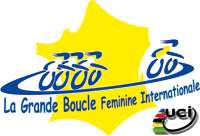Grande Boucle Féminine Internationale
 | |
| Race details | |
|---|---|
| Region | France |
| Discipline | Road |
| Type | Stage race |
| History | |
| First edition | 1984 |
| Editions | 26 (as of 2009) |
| First winner |
|
| Most wins | 3 riders with 3 wins |
| Most recent |
|
The Grande Boucle Féminine Internationale, formerly known as the Tour Cycliste Féminin, was one of the Grand Tours of women's cycle races. Grande Boucle means "big loop" and describes the individual stages which form a circuit around France.
History
From 1984 to 1989, the Tour de France Women was the curtain raising event for the men's event. This event is organised by the Tour de France Society, organiser of the men's Tour de France. In 1990, the event changed its name and format, becoming the Tour of the EEC Women, which ceased in 1993.[1]
In 1992, a new race was created, the Tour cycliste féminine, organised in August by Pierre Boué. In 1998 the event name was changed to the Grande Boucle Féminine Internationale, due to the fact the use of Tour was prohibited due to it being the intellectual property of the Société du Tour de France [2]
The organizers had to scramble for sponsorship nearly every year and were forced to schedule stages in cities which contributed money, regardless of their location. As a result, there were long transfers between the finish of one stage and the start of the next. Another problem in the mid-1990s involved the name. Until 1998, it was the Tour Cycliste Féminin, but the Société du Tour de France, organizers of the men's Tour de France, said that infringed their trademark and in 1999 the name was changed.[3]
In 2004, the race could not be held because of organisational difficulties. It returned, smaller, in 2005. The previous tours were 10 to 15 stages; later ones had five and stayed in one region. The race was also rated lower by the UCI, and had a reduced field. In 2008, the race was six days and seven stages. However, in 2009 the race was only four days long with only 66 riders, after a planned race start and three stages in Britain fell through, leading winner Emma Pooley to joke that the race was "more of a Petite Boucle than Grande."[4][5] The race was discontinued after 2009.
With the subsequent termination of the 10-stage Tour de l'Aude Cycliste Féminin after 2010, the major women's stage race in France became the Route de France Féminine (this was also canceled in 2011, leaving France without a major women's stage race for the first time since the mid-1980s,[6] but returned from 2012).
List of top three riders in general classification
| Year | First | Second | Third |
|---|---|---|---|
| Tour de France Women | |||
| 1984 | |||
| 1985 | |||
| 1986 | |||
| 1987 | |||
| 1988 | |||
| 1989 | |||
| Tour of the EEC Women | |||
| 1990 | |||
| 1991 | |||
| 1992 | |||
| 1993 | |||
See also
Notes
- ↑ https://www.podiumcafe.com/book-corner/2014/9/2/6096243/the-breakaway-by-nicole-cooke
- ↑ https://www.podiumcafe.com/book-corner/2014/9/2/6096243/the-breakaway-by-nicole-cooke
- ↑ Dauncey, Hugh (2012). French Cycling: A Social and Cultural History. Liverpool University Press. pp. 212–213. ISBN 9781846318351.
- ↑ Hedwig Kröner (2008-08-08). "2009 Grande Boucle Féminine starts in Britain". Cyclingnews.com. Retrieved 2011-05-24.
- ↑ Simon Richardson (2009-06-19). "Pooley wins first stage of Grande Boucle". Cycling Weekly. Retrieved 2011-05-24.
- ↑ "Route de France féminine : ce sera pour 2012? (in French)". L'est Eclair. May 22, 2011. Archived from the original on October 9, 2011. Retrieved 2011-06-27.
Further reading
- Scrymgeour, Kristy (2003). "La Grande Débâcle: What's wrong with the women's Tour de France?". cyclingnews.com.